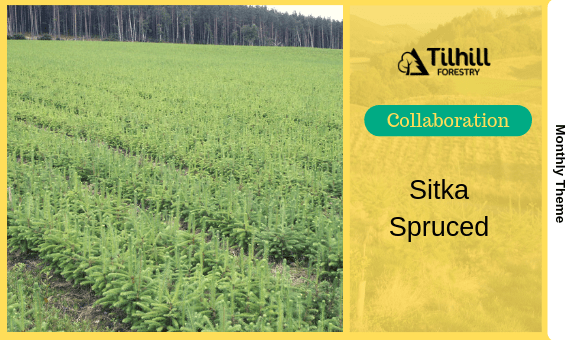Sitka Spruced is a collaboration of the University of Oxford, the University of Edinburgh (Roslin Institute) and Forest Research (an Agency of the Forestry Commission). It is funded by the Biotechnology and Biological Sciences Research Council (BBSRC) and a group of forest and wood processing industries. Tilhill Forestry’s parent company, BSW, is the major industry sponsor.
The increasing demand for timber and the subsequent improvement in its value has brought an ever more important need to focus on the clear economic advantages that could be achieved by reducing generation times as it currently takes 40 years to produce a harvestable tree. The Sitka Spruced project aims to create novel capacity to increase the rates of genetic gain in the UK’s Sitka Spruce breeding programme.
Using a breeding technique called ‘genomic selection’, researchers aim to identify trees which combine the desirable properties of superior timber quality with fast growth. This initiative will improve the economic value of British trees by enhancing wood quality, whilst reducing generation times and providing a local supply of sustainable building materials.
The project will scan the genome of hundreds of trees for natural genetic variations whilst matching these to specific timber and growth traits. The plan is to test several thousands of genes in each tree and leverage the latest science and technology in genomics and bioinformatics. The project will integrate results from detailed analyses of traits that underpin sustainable growth productivity. The technology could be applied to screening Sitka spruce as well as other trees species for tolerance to reduced rainfall, nutrient-poor sites and disease.
Professor John MacKay, Project lead and Wood Professor of Forest Science at Oxford University, said “Genomics offers unprecedented potential for faster tree growth and a reduction of plantation rotation, with improved quality of wood stocks. The economics are clear.”
Dr Gustavo Lopez of Forest Research, said “The financial contribution of the forestry and wood processing industries is significant and we are happy to be working closely with representatives from seed merchants, nurseries, forest management companies, the Conifer Breeding Co-operative and a sawmill. The possible impacts are huge, industry is fully engaged.”
Professor John Woolliams of The Roslin Institute, University of Edinburgh, said “Genomic selection has revolutionised animal breeding where it has increased prediction accuracies and reduced generation times and allowed new traits to be addressed, and all these are benefits that can be realised in forest genetics.”
A Canadian sister initiative will run alongside its UK counterpart, enabling each to leverage their combined resources. The knowledge created will have long-term economic benefits that will support continuous and sustained improvements for the forestry value chain.



